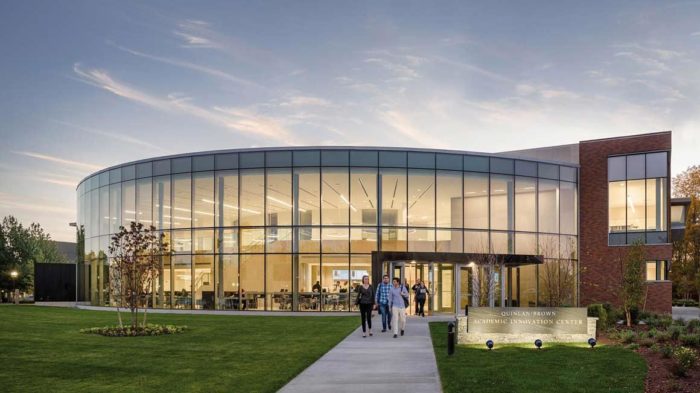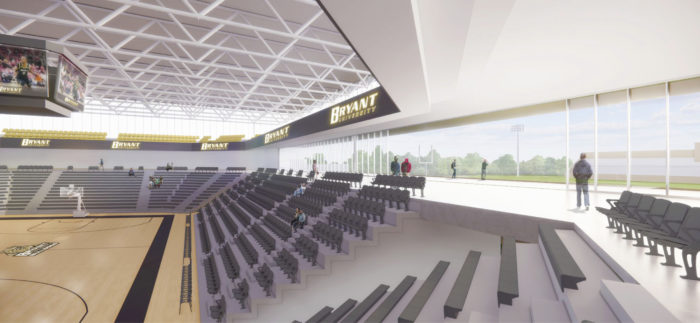Bryant University has been around for 159 years, but when its entourage arrived for the NCAA Men’s Basketball Tournament in Dayton, Ohio, two weeks ago there were more than a few people asking the question: Who are they?
That’s not at all unusual. Through the years, the sporting world and reporters have been wondering the same about Valparaiso, Loyola Marymount and this year’s darling, St. Peter’s University. But each has its own unique story beyond the Big Dance, and Bryant officials were happy to steal a sliver of the spotlight and indulge those who wanted to know more. “People in Dayton were very curious about our university. The national media was very curious,” Bryant President Ross Gittell says. “When they heard our story, they were very impressed.”
Bryant’s team, unfortunately, didn’t make it past Round 64, falling to Wright State 92-83. But its leaders certainly made the most of the build-up to the game, highlighting all the amazing things happening at this 430-acre rural institution in northern Rhode Island.
Before the tournament, one of Bryant’s biggest claims to fame was that it was the summer home of the New England Patriots, long before the Patriots became the Patriots and just as Tom Brady began his long run of Super Bowl wins. But since its shift from College to University, it really has raised its game, both in terms of growing its footprint—it has a stunning new arena and convocation center on the way —and its academic prowess. Its goal is to become a highly acclaimed national institution – like three other perennial tournament teams, Villanova, Notre Dame and Boston College—and it is racing there quickly. Bryant, for those that don’t know, is ranked in the top 1% of institutions in return on investment for students, according to the Georgetown University Center on Education and the Workforce.
“There are very few that at our top 1% of return on investment and also in the NCAA tournament – Villanova. Notre Dame, Yale and the University of Southern California,” Gittell says. “We’re never going to be Yale. Our graduates get hired because they’re real world ready. We embed a lot of experiential learning, a lot of internships, a lot of corporate projects, heavy case studies. So when our students graduate, they’ve done this before.”
What Bryant offers is the training for students that so many institutions are trying to harness, a pipeline to employers that brings them prepared graduates. One of its biggest partners is Fidelity, partly because the company is right across the street but primarily because Bryant’s students are getting a comprehensive business and liberal arts background.
“Fidelity wants graduates who understand the next generation of investors and deliver financial services, not only where there’s high market returns but also a platform for different types of investors to make investment decisions,” Gittell says. “So we constantly upgrade the curriculum. We have an archway investment class, where students manage $3 million of our endowment and they get graded based on their performance over a semester compared to market benchmarks. We have a fixed-income fund that students are managing in a class and then they go work on the fixed income side of investments for Fidelity.”
The lean toward 21st-century skills—Bryant is focusing heavily on data analytics, artificial intelligence and hot trend like cryptocurrency—is part of its Vision 2030 plan, which aims to deliver lifelong education and career advancement for students. Gittell, who took over the position at the height of the pandemic, was a sharp choice because of his background as an economist and as the former Chancellor of the Community College System of New Hampshire.
“It’s very important to understand the changing economy, to act strategically, and you also have to have a very good background in linking the strategy to our financial resources and our financial plan,” he says. “I use my MBA as much as I use my PhD. Having that background in finance and accounting, and strategic management perspective is really important. I’m a believer in small business. Education is really essential in many leadership roles. And we’re training our graduates to be leaders of their organizations.”
It is no secret, especially in New England where private institutions have struggled to set themselves apart in the competitive higher education landscape, that it takes creativity to remain successful. Bryant underwent a self-study to pull together its new strategic plan that was accelerated by the pandemic, with a new “education lens.” Aside from its high ranking among regional universities in the Northeast, its international business program is now in the Top 20. If it isn’t being mentioned in the same breadth as other “B” schools with business punch in New England—Babson, Bentley and Brandeis— it should be.
“We knew we had to do things such as integrating our business education with the STEM disciplines,” Gittell says. “But what really makes Bryant unique is that we’ve integrated business with liberal arts. A student has to major in one and minor in the other. It means our finance graduates often minor in economics or applied math, and our communications graduates minor in marketing, or management. That’s helped not only our business majors be in the top 1% [on ROI], but our liberal arts majors are in the top 1% because they have that business minor.”
Part of Bryant’s acceleration and inclusion on those lofty lists is its heavy focus on residential life and student support. A centerpiece of the Vision plan is a series of construction initiatives that will begin in 2023, including improved academic and dining facilities and the beautiful new Convocation Center that will house its athletic teams – including its powerhouse basketball and volleyball programs – as well as other functions, such as black box theatre events and large gatherings.
“The academic experience will always be primary, but when you’re looking at character development, the ability to work in teams to lead, students must have an experience that they enjoy and remember, so that our alumni are loyal,” Gittell says. “It takes more than just the classroom experience. Over 20% of our students are student-athletes, and their GPA is higher than the student body as a whole. The convocation center really tries to have the campus facilities reflect our values, our integration of the residential life experience with the academic experience and the full student life experience.”
But Gittell knows, even with all the upgrades and the solid academic outcomes, there’s one thing that Bryant must do to get to the next level. “We have a good balance sheet. We’re upgrading our academic facilities. We have been primarily a strong regional university,” Gittell says. “We feel like we’re very well positioned to enhance our national reputation. But we’re going to have to do some marketing, and some stronger branding.”
Making the NCAA Tournament this year certainly didn’t hurt.









